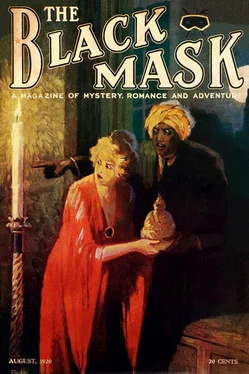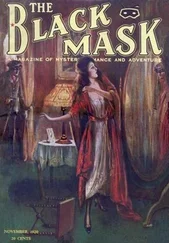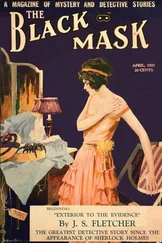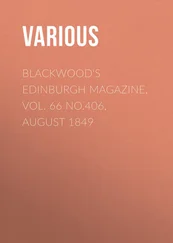J. Thorne - The Black Mask Magazine (Vol. 1, No. 5 - August 1920)
Здесь есть возможность читать онлайн «J. Thorne - The Black Mask Magazine (Vol. 1, No. 5 - August 1920)» весь текст электронной книги совершенно бесплатно (целиком полную версию без сокращений). В некоторых случаях можно слушать аудио, скачать через торрент в формате fb2 и присутствует краткое содержание. Город: New York, Год выпуска: 1920, Издательство: Pro-distributors Publishing Company, Жанр: Детектив, на английском языке. Описание произведения, (предисловие) а так же отзывы посетителей доступны на портале библиотеки ЛибКат.
- Название:The Black Mask Magazine (Vol. 1, No. 5 - August 1920)
- Автор:
- Издательство:Pro-distributors Publishing Company
- Жанр:
- Год:1920
- Город:New York
- ISBN:нет данных
- Рейтинг книги:4 / 5. Голосов: 1
-
Избранное:Добавить в избранное
- Отзывы:
-
Ваша оценка:
- 80
- 1
- 2
- 3
- 4
- 5
The Black Mask Magazine (Vol. 1, No. 5 - August 1920): краткое содержание, описание и аннотация
Предлагаем к чтению аннотацию, описание, краткое содержание или предисловие (зависит от того, что написал сам автор книги «The Black Mask Magazine (Vol. 1, No. 5 - August 1920)»). Если вы не нашли необходимую информацию о книге — напишите в комментариях, мы постараемся отыскать её.
The Black Mask Magazine (Vol. 1, No. 5 - August 1920) — читать онлайн бесплатно полную книгу (весь текст) целиком
Ниже представлен текст книги, разбитый по страницам. Система сохранения места последней прочитанной страницы, позволяет с удобством читать онлайн бесплатно книгу «The Black Mask Magazine (Vol. 1, No. 5 - August 1920)», без необходимости каждый раз заново искать на чём Вы остановились. Поставьте закладку, и сможете в любой момент перейти на страницу, на которой закончили чтение.
Интервал:
Закладка:
"It's not theory," I returned. "It's a fact, a grim, irresistible fact. As I told you, I have reached my conclusions by way of scientific research."
"But how?" asked Gates. "I don't understand."
"For example," I replied, "I have gone to a man of thirty-seven night after night for a month and reviewed the entire day with him. I have tabulated the whole of his waking hours under three heads — Joy, Sorrow, Neutral. Under the first caption I have listed everything, no matter how trivial, that afforded the subject content or satisfaction. Under Sorrow I have scheduled every disappointment, every ache, every annoyance, no matter how petty — everything he had hoped would not happen, and so on. Under Neutral I have put these things that could not properly be classed under either of the other headings."
"And the result?"
"In the particular case I am speaking of there were twice as many notations under Sorrow as there were under Joy. I conducted my inquiries with a great number of men and women over a long period and the results were about the same. With younger persons it was just the reverse. The dividing line seemed to be just at thirty-five. Between thirty and thirty-five the Joys and Sorrows about balanced with a great number of notations in the Neutral column. Under thirty the Joys and Neutrals seemed to have the field pretty well to themselves."
"Often, of course, the Law of Compensation begins operating lightly and years may elapse before the victim notices that he is being dunned for payment. But settlement must be made and it is made through the body, through those held dear, through ambition, pride, vanity, through everything that is cherished and clung to. But I am going to dance and leave without paying the piper."
Gates listened quietly to my conclusion and with serious expression.
After a moment of silence, he said:
"The ordinary person would laugh at you, Paul, and call you crazy, but I believe that I understand you. Boyhood sorrows have merely distorted your views of life. I have no doubt of your sincerity and I do not question that right now you believe that you will kill yourself when you are thirty-six. Permit me, as a friend, to doubt it. I venture to say that you will be married in 1920, be the father of several children and would blush and stammer like a schoolgirl if I should happen along and repeat what you have just told me. You are young and in the next fifteen years your conception of life will undergo a radical series of changes."
"No, Arthur," I returned, "I shall not change my mind. I propose to enjoy the time I have allowed myself to the utmost. At the end of that period you will read of my death — if you haven't forgotten all about me. That's all. Let's go down town, have a few drinks and see a show."
Gates was glad to go. I never mentioned the subject of my plans to him again. During some of our boisterous celebrations I often caught a queer smile in his eyes, but he said nothing.
After graduation we separated. Gates went to his home in California while I moved to New York. For a few years we corresponded in a loose fashion and then lost touch.
I lived up to my set program. With a generous income I was able to do about what I pleased. I went where I wished, ate and drank what and where I wanted, and did little work except that connected with looking after my property. I remained free of serious love entanglements, my health continued excellent and I had no worries. I do not recall an ache or a pain or a severe disappointment in fifteen years.
There was a girl — her name is of no moment — a girl of wondrous beauty and celestial character, who did stagger my resolution for a brief spell. When I felt myself weakening I went to Bellevue Hospital where I knew a house surgeon, and walked through the wards. The Law of Compensation was operating on high gear that evening. I finished my tour, had a good laugh and never saw her again.
So this is the last night. I feel strangely happy. For my final repast I have ordered a royal gorge. I shall dine heartily at midnight and drink many a glass of rare vintage to the vanquished Law of Compensation. Then to bed for a few hours of calm rest. After that, tomorrow morning and 7:32.
IV
The following letter was received in the coroner's office from Dr. J. P. Sypes:
Dear Sir:
The enclosed communication or manuscript was found on a table in the room where Paul Traverse died last night. His death was entirely natural and was due, as stated in the burial certificate, to acute gastritis. The attack followed upon an unusually heavy meal he had eaten before retiring. The matter I am sending you was, I presume, a literary effort on his part.
After Midnight
by Marthe Neville
I
"Good night, Mr. Lannen." Louise Willoughby extended her hand.
"We breakfast at nine," she said "I'll see you then. I hope you sleep well."
"Thank you, I'm sure I shall."
She gathered the folds of an embroidered chiffon gown about her and slowly mounted the stairs. Lannen stood leaning against the newel post and watched her ascend.
As he turned away, he faced his host. The cold metallic glitter in the older man's black eyes gave him a strange uncomfortable feeling. "Well?" said Willoughby. "She's charming, Andrew; you should be proud of her. She has improved wonderfully in the three years since I saw her."
A slow smile crept about the drawn lips of the physician. It did not extend to his eyes, but became lost in the heavy mustache and Van Dyke beard he wore.
Lannen again shivered. The snaky glitter in his physician-friend's eyes fascinated him. He wondered if it could be true; that the woman who had just left him, with purity written on every curve and line of her, could be the wanton thing her husband fancied; that she had so forgotten herself and her social position as to stoop to an intrigue with her gardener.
It seemed impossible of Louise Willoughby. Yet many changes had taken place during the three years he had been abroad. He had not known her well before his departure, perhaps he did not know her at all now.
"Come up into my laboratory," Willoughby said suddenly.
He closed the windows and switched off all the lights with the exception of one held in a bronze Venus at the foot of the stairs.
"Andy," Lannen said as they entered the heavily odorous room, "I'd rather you said nothing more about this to me. Some day you will be sorry for having taken me into your confidence; and then our friendship will end. There are some things a man has no right to discuss with another. I don't need to remind you of that. This is one of them!"
"I've got to talk to some or go mad! You think it's my imagination! You think I'm a jealous fool! I tell you I know . From the day that man came here, she ha,s been different. I've watched them — I've seen his arm around her, I've heard him call her Louise—"
He broke, and buried his head on his arms he had flung on the table before him.
Lannen gripped his shoulder and shook him. "Why don't you send him away?"
Willoughby raised his bloodshot eyes. "And admit defeat? Give him the pleasure of saying he was fired because Andrew Willoughby's wife fell in love with him! — Never! Besides—" he sprang to his feet, and paced the little room nervously, his long hands with their gnarled crooked fingers, stained with chemicals, twitching and pulling at his coat as he walked " — how do I know that she won't go with him if I send him away?"
Lannen remembered the brief glimpse he had had of the gardener. A slim tall fellow, little more than a boy, with close cropped dark hair, a pale almost ethereal face, a quiet unassuming manner.
"How long has he been here?"
"Allering? Six weeks!"
Willoughby, hit the glass-topped table nervously. As he did so a tiny vial of amber covered liquid fell over, knocking the stopper out of it. A pungent sickish odor filled the room. The doctor gave a startled cry.
Читать дальшеИнтервал:
Закладка:
Похожие книги на «The Black Mask Magazine (Vol. 1, No. 5 - August 1920)»
Представляем Вашему вниманию похожие книги на «The Black Mask Magazine (Vol. 1, No. 5 - August 1920)» списком для выбора. Мы отобрали схожую по названию и смыслу литературу в надежде предоставить читателям больше вариантов отыскать новые, интересные, ещё непрочитанные произведения.
Обсуждение, отзывы о книге «The Black Mask Magazine (Vol. 1, No. 5 - August 1920)» и просто собственные мнения читателей. Оставьте ваши комментарии, напишите, что Вы думаете о произведении, его смысле или главных героях. Укажите что конкретно понравилось, а что нет, и почему Вы так считаете.












